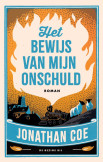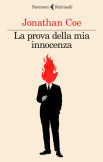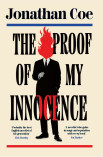The Proof of My Innocence
CATEGORY: Fiction
After writing Bournville I wanted a change of pace and a change of style. I remembered how Graham Greene used to subtitle some of his novels ‘an entertainment’, and wondered if I might attempt to write something along those lines. Bournville had been a relatively straightforward family saga, a human comedy of generational politics underpinned by a sense of melancholy at the passage of time. I now felt like writing something contemporary, ironic and harder-edged. I wanted to return, if possible, to the tone of What a Carve Up!, with some kind of metatextual crime story which would also reflect on the current political situation.
One of the first things I decided upon was the timeframe of the novel. For seven weeks in the autumn of 2022, Britain had passed through an extraordinary historical moment: the short-lived tenure of Liz Truss as Prime Minister. It now felt like an incredible, almost surreal episode. What better setting could there be for a story which, early on in its development, would become deliberately untethered from reality and enter a fantasy world?
The first half of the novel is an exercise in ‘cosy crime’. I first became aware of this term in France, surprisingly, when I visited a bookshop in Hossegor and found that the shop had a large section devoted to the genre. (The signage used the phrase in English.) In fact according to the Oxford Companion to Crime and Mystery Writing the term goes back to 1958. My aim was not to subvert or make fun of cosy crime but simply to work within its conventions: so in my novel the reader will find a country-house murder, an eccentric detective, a secret passage, a cryptic note left by a dying man and all the other trappings which make the genre so enjoyable.
Part Two of the book shifts into ‘dark academia’ and draws on my memories of being a student at Cambridge in the early 1980s. Curiously I’ve never revisited this part of my life in fiction before: perhaps it took me forty years to get some perspective on it. Finally, in the third part, two female narrators take over and as well as bringing the mystery story to a conclusion, the novel confronts the issue of subjective versus objective truth, and how the multifaceted nature of reality is best conveyed in storytelling. Another, more overtly political theme of the book is how the conservative movement has become radicalised in the last forty years, on both sides of the Atlantic.
However, my main purpose in writing the novel always came back to Greene’s notion of ‘an entertainment’. The Proof of My Innocence is full of jokes – some of them corny, some (I hope) a bit more sophisticated – and narrative curve-balls. First and foremost, my intention was simply to give the reader a good time while journeying through it.



